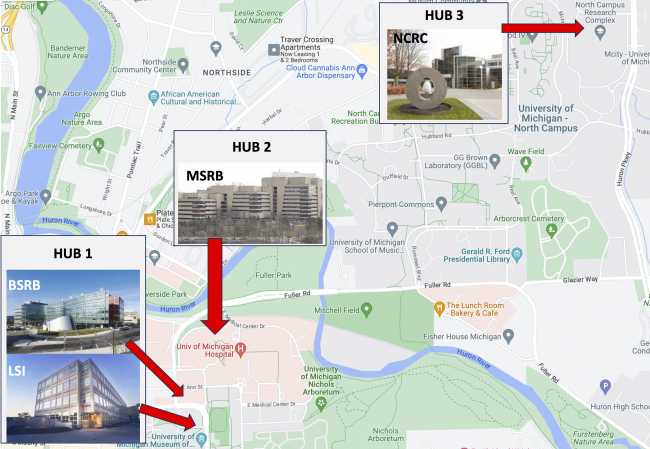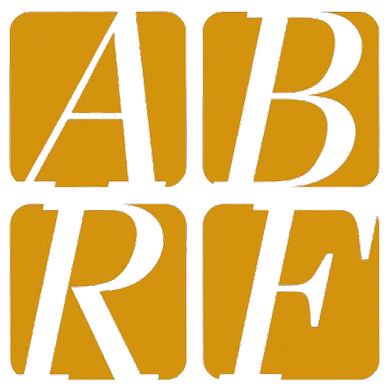2023 ANNUAL MEETING
Core Tours
Monday, October 16, 2023
8:30 – 11:30 AM
Core tours across all 3 University of Michigan campuses. Included cores and facilities are subject to change.

HUB 1 – MAIN CAMPUS
Cryo-Electron Microscopy Lab
Natural Products Discovery Core
Center for Chemical Genomics
Center for Structural Biology
BRCF Microscopy Core (BSRB Location)
The Lurie Nanofabrication Facility
Biomolecular Nuclear Magnetic Resonance Core
Sponsored by:

HUB 2 – MEDICAL CAMPUS
TOUR A
BRCF Flow Cytometry Core
BRCF Epigenomics Core
BRCF Proteomics and Peptide Synthesis Core
Michigan Diabetes Research Center (MDRC) Chemistry Laboratory
BRCF Vector Core
BRCF Bioinformatics Core
BRCF Biomedical Research Store
TOUR B
BRCF Proteomics Resource Facility (PRF)
Tissue and Molecular Pathology Core
BRCF Transgenic Animal Model Core
Microbiome Core
Sponsored by:

HUB 3 – NORTH CAMPUS
BI Nanotechnicum Core
Cytof Core
Central Biorepository
Michigan Center for Materials Characterization
BRCF Advanced Genomics Core
In-Vivo Animal Core (IVAC)
Sponsored by:

Participating Cores
BI Nanotechnicum Core
The Nanotechnicum houses several instrument suites for particle characterization, thermal, and optical analysis. The Nanotechnicum also maintains a radioactive lab for determining the degree of protein resistance of medical devices, quantifying ligand attachment to surfaces, or labeling nanoparticles. The Nanotechnicum’s state-of-the-art instrumentation is managed and maintained by BI staff with long-term expertise in different areas of nanomaterials.
Biomolecular Nuclear Magnetic Resonance
The Biomolecular Nuclear Magnetic Resonance (BioNMR) Core facility at University of Michigan’s primary mission is to provide access to advanced NMR spectroscopic methods and tools to students, postdoctoral fellows, and faculty of the University for the advancement of their research. This facility is equipped with four instruments with various field strengths and capabilities. Of the four instruments, two are equipped with cold/cryoprobes capable of giving high signal to noise for biological samples. The facility houses two Ph.D.-level scientists ready to facilitate data acquisition, project consultation, and data analysis.
BRCF Advanced Genomics Core
Our mission is to facilitate research in cutting-edge fields of genetics and genomics by implementing complex technologies. Chief among these is “next-generation” sequencing (NGS), which has revolutionized research in virtually all biological fields in the past decade. By housing NGS and companion genomic technologies in a single facility, we provide centralized expertise in advanced methods that enables all researchers to effectively exploit them for making scientific discoveries.
BRCF Bioinformatics Core
The BRCF Bioinformatics Core helps researchers identify and interpret patterns in RNA and DNA by placing sequencing data into a biologically meaningful context. This encompasses assisting with experimental design, developing reproducible workflows, analyzing next-generation sequencing data, and supporting manuscript development/publication.
BRCF Biomedical Research Store
The BRCF Biomedical Research Store provides University of Michigan research investigators with easy, on-site procurement of enzymes, reagents, and kits used in molecular work, cell biology, and some protein chemistry. The four Biomedical Research Store locations have order contracts with 13 vendors for more than 500 in-stock items available same day, and approximately 20,000 more are available via special order with expedited shipping (typically 1-2 days). Our large-volume vendor contracts enable the Store to negotiate very low prices as well as eliminate all shipping and packaging fees.
BRCF Epigenomics Core
The BRCF Epigenomics Core provides resources and services to prepare samples for analysis in epigenetic regulation in both genome-wide and locus-specific manners. Epigenetic regulation refers to DNA sequence-independent regulation of heritable traits that impacts gene expression. In recent years the term has broadened to also encompass processes that control gene expression and genomic functions beyond DNA sequence but which may be more transient or facultative in nature.
BRCF Flow Cytometry Core
The BRCF Flow Cytometry Core provides instrumentation and expertise to University of Michigan investigators – and the surrounding biotech community – in a broad range of basic and medical science disciplines. Samples are prepared by individual investigators, who then deliver samples to the Core for flow cytometric analysis or cell sorting. The Core also provides assistance in grant and publication preparation, publication-quality graphics, and the development of experimental designs.
BRCF Microscopy Core (BSRB Location)
The BRCF Microscopy Core provides access to advanced light and electron microscopes as well as the expertise of dedicated imaging scientists. We provide custom image analysis, comprehensive sample preparation for electron microscopy, as well as clearing and expansion for light microscopy.
BRCF Proteomics and Peptide Synthesis Core
The BRCF Proteomics & Peptide Synthesis Core provides research services in proteomics, protein analysis by mass spectrometry, and other techniques, as well as custom peptide synthesis. The Core offers the full range of services in qualitative and quantitative proteomics, including the preparation of (unprocessed) clinical research samples as well as biological samples.
BRCF Proteomics Resource Facility (PRF)
The PRF is a mass spectrometry-based facility dedicated exclusively for bottom-up proteomics offering wide-ranging proteomic services in a highly cost-effective and timely manner. The PRF has all the necessary expertise and instrumentation to fulfill its mission right here on campus providing opportunities for close interaction with PRF personnel to fine-tune experiments for a successful outcome. After beginning operations in 2007 within the Department of Pathology, the PRF transitioned to the Biomedical Research Core Facilities in the fall of 2022.
BRCF Transgenic Animal Model Core
The Transgenic Animal Model Core was established in 1989 in response to the need for transgenic technology by University Investigators. The mission of the Transgenic Core is to provide access to transgenic animal technology in an efficient, effective manner. Researchers can use Transgenic Core laboratory space and resources side by side with staff members. Consultation in all phases of genome editing (CRISPR/Cas9), transgenic, and gene targeting research from experimental design to mouse breeding is freely available. The Core’s mission is to provide access to a complex technology so that investigators can focus their resources on research instead of developing tools for research.
BRCF Vector Core
The BRCF Vector Core produces biological products (gene transfer vectors) that facilitate the transfer of specific genes into either normal or aberrant cells. The Vector Core also provides intellectual and technical advice to researchers regarding the optimal use of these systems. Gene transfer vectors require special handling precautions and manufacturing systems that lend themselves to a core structure that optimizes efficiencies of scale and cost to the research community.
Center for Chemical Genomics
The Center for Chemical Genomics provides high-throughput screening of extensive small molecule, natural product and siRNA libraries — along with assay development and optimization — for basic biology and drug discovery projects. Our dedicated staff has years of experience in academic drug discovery and within the pharmaceutical industry, allowing us to provide expert guidance to researchers through every stage of a project.
Center for Structural Biology
The Center for Structural Biology is a comprehensive structural biology resource for researchers at the University of Michigan and beyond. Part of the U-M Life Sciences Institute, the CSB includes
a high-throughput protein laboratory for protein engineering, protein purification facilities for small- and large-scale protein production, macromolecular crystallization and crystallography laboratories for solving crystal structures of biological molecules, and an X-ray facility with access to high energy synchrotron radiation.
Central Biorepository
The Central Biorepository (CBR), a unit of the University of Michigan Medical School Office of Research, facilitates discovery and improves healthcare outcomes by providing high-quality, highly annotated biospecimens donated for basic, clinical, and translational research. We are an enterprise-wide resource, serving all members of the University of Michigan community.
Cryo-Electron Microscopy Lab
Advances in microscope technology and computing have paved the way for cryo-electron microscopy to move structural biology into a new era — allowing scientists to study the form and function of biological “machines” that are too large to study using X-ray crystallography. The U-M Life Sciences Institute is home to a world-class electron microscopy facility, with state-of-the-art instruments and faculty specializing in this emerging field.
Cytof Core
The goal of the CyTOF core provides equipment and expertise for mass cytometry experiments. Mass Cytometry combines flow cytometry and mass spectrometry, to provide multiparametric analysis of single-cells or tissues. We offer imune profiling panels for 29 or 16-color analysis of cells in suspension, custom CyTOF antibody conjugation and data acquisition on our Helios and Hyperion CyTOF instruments. Other instruments include a flow cytometer and FPLC system to validate antibodies and purification respectively.
In-Vivo Animal Core
The In-Vivo Animal Core (IVAC) is a core research pathology laboratory run by the Unit for Laboratory Animal Medicine (ULAM). The core provides a multitude of high-quality research and diagnostic pathology support services to the U-M research community. IVAC’s team of board-certified veterinary pathologists and highly-experienced technicians offer rapid turn-around on services including:
• Necropsy/tissue collection
• Histology/immunohistochemistry
• Animal hematology/clinical chemistry
• Pathology interpretation and quantitative image analysis
• Digital slide scanning (brightfield)
• Project consultation
The Lurie Nanofabrication Facility
The Lurie Nanofabrication Facility is a world-class facility that serves the entire University of Michigan as well as researchers around the world. Each year, approximately $55M in technology-advancing research happens in an environment that is so clean, in some parts there are no particles larger than 0.3 microns – which is about the size of the smallest bacterial cell. It was built to facilitate next-generation research in semiconductor device and circuit fabrication, integrated microsystems and MEMS technologies, and broad areas of nanotechnology including nanoelectronics, nanophotonics, and nanobiotechnology. The LNF also allows researchers to explore new materials for applications ranging from healthcare to national security.
Michigan Center for Materials Characterization
The Michigan Center for Materials Characterization, also known as (MC)2, is the University of Michigan’s facility dedicated to the micron and nanoscale imaging and analysis of materials. The center provides state-of-the-art instruments, professional training, and in-depth education for students and other internal researchers, fellow academic institutions, and local industry. (MC)2 supports a diverse multi-disciplinary user base of more than 450 users from various colleges and departments, 100+ internal research groups, and over 20 non-academic companies.
Michigan Diabetes Research Center (MDRC) Chemistry Laboratory
The MDRC Chemistry Laboratory offers accurate and reproducible data using a variety of assay models (automated, RIA, ELISA, multiplex) for the research community’s short-term and long-term human and animal studies related to diabetes, heart disease, and hypertension.
Microbiome Core
We offer services and resources to microbiome researchers from across campus and beyond. Our services include bacterial RNA-Seq, nucleic acids extraction, microbial community profiling, microbial whole genome sequencing. The core uses Illumina MiSeq sequencers, and liquid handling robots for sample and library preparation. We recently added a Bruker MALDI Biotyper Sirius GP instrument for microbial isolate identification.
Natural Products Discovery Core
Roughly half of the drugs in clinical use today started as natural products — molecules that evolved inside microorganisms and plants that form the backbone of antibiotics, anti-cancer agents and other medicines. Over the past decade, the University of Michigan has become a leader in natural product sciences. The LSI’s Natural Products Discovery Core has developed a 45,000-sample (and growing) library of natural product extracts derived from a unique collection of diverse marine and terrestrial actinomycetes, fungi and cyanobacteria. The core provides researchers at U-M and external partners with the technology and expertise to develop candidates identified through high-throughput screening into unique, bioactive, patentable, small molecules.
Tissue and Molecular Pathology Core
Provides Tissue Procurement and Evaluation Excellence to Support Research. The core provides services relating to the procurement and evaluation of tissue for research, histology and molecular pathology.

